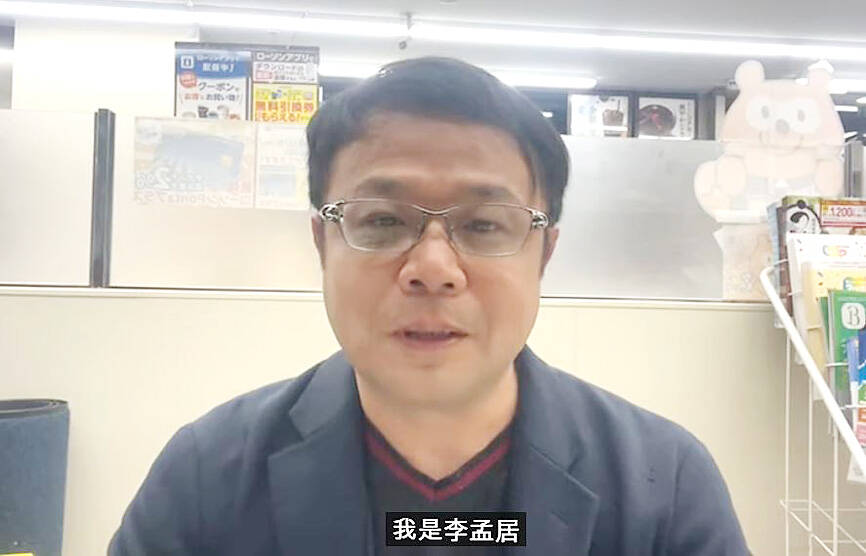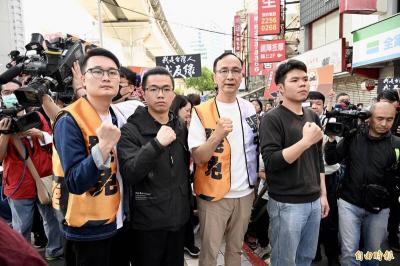Taiwanese national Morrison Lee (李孟居) on Sunday said he was “brutally arrested” by the Chinese border police in 2019 for simply showing support for protests in Hong Kong and a strike launched by EVA Airways’ flight attendants, before being falsely accused of spying.
After being convicted of espionage, Lee was in 2019 was sentenced to one year and 10 months in prison, and two additional years during which he would be disenfranchised. He was informed one month before finishing his prison sentence that he was banned from leaving China during the period of disenfranchisement.
Having spent nearly four years in China, Lee was given permission to leave China for Japan on Thursday last week.

Photo: screen grab from Morrison Lee’s YouTube channel
“I am happy to have returned to the free world. I feel completely released from the tension, pain and helplessness that have plagued me over the past four years,” he said in a YouTube video.
Lee said he is still experiencing symptoms of post-traumatic stress disorder and wants to stay in Japan for a while to seek treatment, so that he is in the best condition possible when he meets the Taiwanese public.
“I will let everybody know when I decide to go back to Taiwan. Please do not worry about me. I am safe here,” he said.
Lee described in the video what happened on Aug. 20, 2019, when he tried to cross the border in Shenzhen to Hong Kong to board a flight to Taipei.
At the time, the territory was at the peak of a democratic uprising triggered by the Hong Kong government’s introduction of an extradition bill, he said.
“I arrived in Hong Kong on Aug. 18 and went to Shenzhen the next day to meet my coworkers, collect product samples and have business meetings. On Aug. 20, I was subject to a very strict baggage check when I tried to pass the border in Shenzhen to go to Hong Kong. My guess is that the strict search had something to do with the protests against the extradition bill,” he said.
The Chinese border police then found small cards in his baggage that had “Go, Hong Kong!” printed on them, as well as a few pink cards that read: “Love, peace, compassion and communication,” Lee said.
The pink cards were printed to support EVA Airways’ flight attendants who were on strike, he added.
“To the border police, these cards appeared to be paraphernalia that were used to encourage protests. As such, they brutally arrested me after accusing me of engaging in criminal activities that threatened national security,” he said.
Lee said that he was later accused of being a Taiwanese spy for taking pictures of armed Chinese police gathering on the border between Shenzhen and Hong Kong.
He was subsequently convicted and imprisoned on suspicion of committing espionage and sharing state secrets.
“I was not a Taiwanese spy as China claimed. I was only a curious passerby,” he said.
Although the incident has left him with indelible pain, Lee said his suffering was like “bearing the cross” for everyone.
He said he does not want the incident to hurt anoyone’s feelings, be they Taiwanese or Chinese.
“I hope Beijing will be willing to open up to communicate with people in Taiwan and in China with love, peace and compassion,” he said.

The Ministry of Economic Affairs has fined Taobao NT$1.2 million (US$36,900) for advertisements that exceeded its approved business scope and ordered the Chinese e-commerce platform to make corrections in the first half of this year or its license would be revoked. Lawmakers have called for stricter supervision of Chinese e-commerce platforms and more stringent measures to prevent China from laundering its goods through Taiwan as US President Donald Trump’s administration cracks down on origin laundering. The legislature’s Finance Committee yesterday met to discuss policies to prevent China from dumping goods in Taiwan, inviting government agencies to report on the matter. Democratic Progressive Party

Taiwan and its Pacific ally Tuvalu on Tuesday signed two accords aimed at facilitating bilateral cooperation on labor affairs, according to Taiwan’s Ministry of Foreign Affairs (MOFA). The governments inked two agreements in Taipei, witnessed by Foreign Minister Lin Chia-lung (林佳龍) and visiting Deputy Tuvaluan Prime Minister Panapasi Nelesone, MOFA said in a news release. According to MOFA, the agreements will facilitate cooperation on labor issues and allow the two sides to mutually recognize seafarers’ certificates and related training. Taiwan would also continue to collaborate with Tuvalu across various fields to promote economic prosperity as well as the well-being of their

The Taipei District Prosecutors’ Office has continued its investigation into allegations of forged signatures in recall efforts today by searching the Chinese Nationalist Party’s (KMT) city chapter and questioning several personnel including the chapter director, according to media reports. Among those questioned and detained were KMT Taipei chapter director Huang Lu Chin-ju (黃呂錦茹), chapter secretary-general Chu Wen-ching (初文卿), chapter secretary Yao Fu-wen (姚富文) and first district committee executive director Tseng Fan-chuan (曾繁川). Prosecutors said they would not confirm reports about who had been summoned. The investigation centers on allegations that the ongoing recall campaigns targeting Democratic Progressive Party legislators Rosalia Wu (吳思瑤)

Several Chinese Nationalist Party (KMT) officials including Chairman Eric Chu (朱立倫) are to be summoned for questioning and then transferred to prosecutors for holding an illegal assembly in Taipei last night, the Taipei Police said today. Chu and two others hosted an illegal assembly and are to be requested to explain their actions, the Taipei City Police Department's Zhongzheng (中正) First Precinct said, referring to a protest held after Huang Lu Chin-ju (黃呂錦茹), KMT Taipei's chapter director, and several other KMT staffers were questioned for alleged signature forgery in recall petitions against Democratic Progressive Party (DPP) legislators. Taipei prosecutors had filed